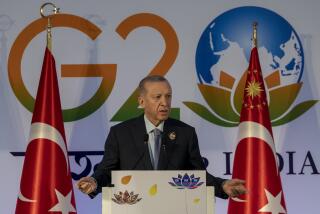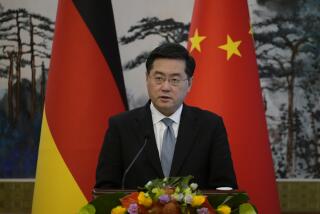Iraqi Rebuffs Kremlin, Rejects a Kuwait Pullout : Diplomacy: Hussein aide, visiting Moscow, insists Baghdad had the right to seize its neighbor. It just explained things badly, he adds.
- Share via
MOSCOW — Brushing aside renewed calls by Soviet President Mikhail S. Gorbachev for the withdrawal of Iraqi troops from Kuwait and Moscow’s warnings of increased international sanctions, Iraq’s foreign minister said here Thursday that his country intends to retain the Persian Gulf emirate.
Tarik Aziz, the Iraqi foreign minister, showed no readiness to compromise after talks with Gorbachev and other Soviet officials, declaring that Baghdad would not relinquish its hold on Kuwait and would continue the struggle against foreign forces in the gulf.
Aziz, insisting that Iraq had every right to seize oil-rich Kuwait and conceding only that his government had explained its position badly, said he wanted to brief Gorbachev before the Soviet leader’s weekend meeting with President Bush in the Finnish capital, Helsinki.
“We had our differences, but at the same time, in compliance with the tradition of friendship and good relations between the Soviet Union and Iraq, we had a constructive, cordial and frank exchange of views,” Aziz told a press conference.
“I did not ask President Gorbachev to convey a message to President Bush,” Aziz continued. “We just had an exchange of views about our positions, and it is up to (Gorbachev) to use the information I gave and the arguments I put. I leave it to his judgment. . . .
“If the Soviet government would like to play a more active role in this issue, we would welcome it, and if the Soviet government has anything to tell us after the Helsinki meeting, we would welcome that.”
But Soviet officials, who had told Aziz not to come unless he was prepared to compromise, were discouraged by Iraq’s hard-line stand.
“There was nothing new,” Gennady I. Gerasimov, the Soviet Foreign Ministry’s chief spokesman, told reporters. “We had hopes, but we were disappointed. . . .
“Our position remains clear and quite firm: The international community will accept nothing less than the immediate, complete and unconditional withdrawal of Iraqi forces from Kuwait and the full restoration of its sovereignty, independence and territorial integrity.”
A senior Western diplomat, who has consulted closely with top Soviet officials on the gulf crisis, said Iraq had tried with the Aziz trip to drive a wedge between Moscow and Washington but had apparently failed.
“We will see what President Gorbachev brings to Helsinki, but the Iraqis apparently gave him nothing new,” the diplomat said. “At the same time, the Soviet and U.S. positions remain very, very close, differing only in details.”
One difference--the presence of Soviet military advisers as training officers--is likely to be resolved as their contracts expire in coming weeks and are not renewed, Soviet officials said. Aziz said the officers, who number 193 among the more than 6,000 Soviet specialists employed in Iraq, “can stay or they can leave.”
Gerasimov dismissed the Iraqi proposal to link the withdrawal of Iraqi troops from Kuwait to Israel’s withdrawal from the West Bank, Gaza Strip and other occupied Arab territories.
“It is this aggression by Iraq that is on the top of the agenda, and I don’t think we should link this aggression with any other issues,” Gerasimov said. “Otherwise, the resolution of this conflict will be postponed indefinitely.”
Aziz had argued that Iraq was being held to a double standard because the U.N. Security Council had never used sanctions in efforts to enforce its resolutions on the Arab-Israeli conflict.
For this reason, he doubted that the United Nations and Javier Perez de Cuellar, its secretary-general, would be able to mediate effectively in the gulf crisis.
Aziz, a Christian from a mostly Muslim country, was asked whether he saw a contradiction between his faith and Hussein’s call Wednesday for a jihad, an Islamic holy war.
“I don’t see any contradiction between the call for jihad, or for a struggle against imperialists, and religion,” he replied. “If you look at the essence of Islam and the essence of Christianity, they are against the acts of President Bush and Prime Minister (Margaret) Thatcher.”
Were Bush and Thatcher true Christians, Aziz continued, they would have opposed the tough measures used by Israel to suppress Palestinian nationalism. “I have never looked at Mr. Bush or Mrs. Thatcher as good Christians,” he said.
More to Read
Sign up for Essential California
The most important California stories and recommendations in your inbox every morning.
You may occasionally receive promotional content from the Los Angeles Times.










